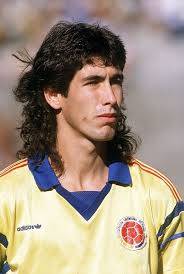Andrés Escobar: The Tragic Story of a Colombian Football Legend
Early Life and Career
Andrés Escobar was born on March 13, 1967, in MedellÃn, Colombia. He grew up in a family that was passionate about sports, which influenced his early love for football. Escobar began his professional career at Atlético Nacional in 1986, where he quickly established himself as a talented and reliable defender. His skill on the pitch, combined with his leadership qualities, soon earned him a reputation as one of Colombia's best players.
Rise to Prominence
Escobar's international career took off when he was selected to represent Colombia in the 1990 FIFA World Cup held in Italy. Although Colombia did not advance past the group stage, Escobar's performances were commendable and showcased his potential on a global stage. He continued to play for the national team and became a key player in subsequent tournaments.
His most notable achievement came during the 1994 FIFA World Cup in the United States. Escobar captained the Colombian team, which was highly anticipated to perform well in the tournament following a successful qualification campaign. However, the team faced a shocking and unexpected early exit from the tournament, culminating in a devastating 2-1 loss to the United States in their opening match.
The Tragic Incident
The 1994 World Cup turned into a nightmare for Escobar after he inadvertently scored an own goal in a match against the United States. This mistake was not only a critical moment in the game but also became a focal point for the media and fans who were deeply disappointed by Colombia's performance.
Upon returning to Colombia, Escobar faced severe backlash from fans, with many blaming him for the team's failure. The country was already grappling with societal issues, including drug-related violence and political instability, which heightened the tensions surrounding the national team's performance.
On July 2, 1994, just days after Colombia's exit from the World Cup, Andrés Escobar was shot and killed outside a nightclub in MedellÃn. It is widely believed that his murder was linked to the anger and frustration of fans who held him responsible for the own goal, although the circumstances surrounding his death remain shrouded in controversy and tragedy.
Legacy
Andrés Escobar's death sent shockwaves throughout the football world and beyond. His tragic end highlighted the intense pressures athletes face, particularly in countries with a complex socio-political landscape. Escobar is remembered not only for his contributions to Colombian football but also as a symbol of the dangers that can arise from the intersection of sports, national pride, and violence.
In the years following his death, Escobar has been honored in various ways, including tributes from fans, memorial matches, and documentaries that capture his life and legacy. His story serves as a poignant reminder of the fragility of life and the responsibilities that come with fame and success in the world of sports
Conclusion
Andrés Escobar remains an iconic figure in Colombian football history. His talent as a defender and his tragic fate have left an indelible mark on the sport. Escobar's legacy continues to resonate, inspiring discussions about the pressures athletes face and the impact of violence in society. His story is a reminder of the passion and pride that sports evoke, as well as the darker realities that can accompany them.




No comments yet
Be the first to share your thoughts!